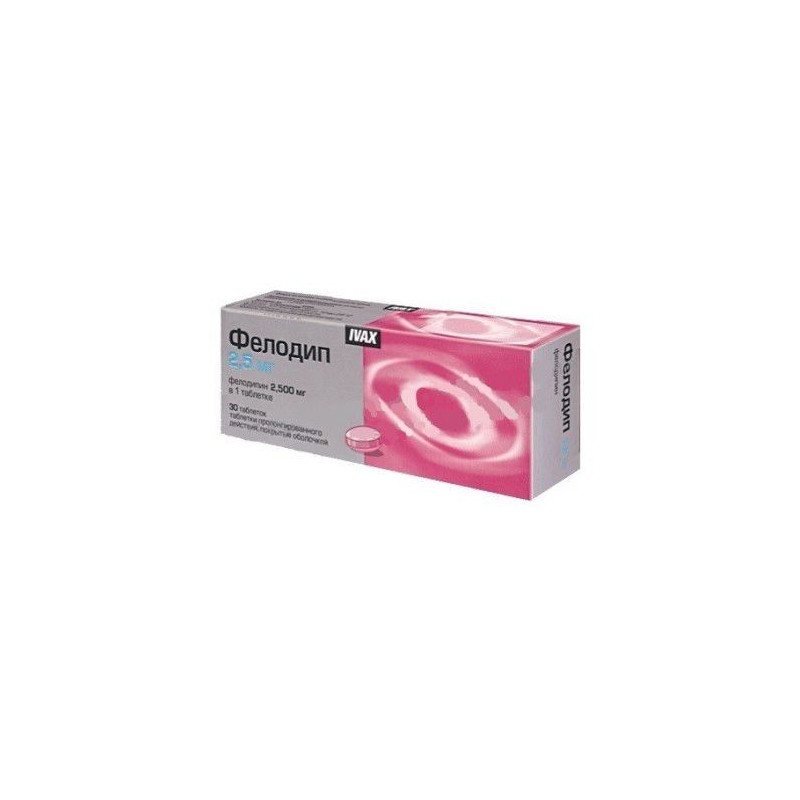



 All payments are encrypted via SSL
All payments are encrypted via SSL
 Full Refund if you haven't received your order
Full Refund if you haven't received your order
- Arterial hypertension.
- Angina pectoris (including Prinzmetal angina pectoris).
- Unstable angina.
- Acute myocardial infarction and a period of up to 1 month after myocardial infarction.
- Cardiogenic shock.
- Clinically significant aortic stenosis.
- heart failure in the stage of decompensation.
- Severe arterial hypotension.
- Pregnancy.
- Lactation (breastfeeding).
- Children and adolescents under 18 years of age (efficacy and safety have not been established).
- Hypersensitivity to the drug or to other dihydropyridine derivatives.
With caution, use the drug for liver and / or renal failure.
Felodip is contraindicated for use during pregnancy and lactation (breastfeeding).
The drug is recommended to take in the morning before a meal or after a light breakfast. pills should not be cracked, divided or crushed.
Use in hypertension: The dosage regimen for adults (including elderly people) is set individually.The initial dose is 5 mg 1 time / day (during the selection of the dose is recommended to use 2.5 mg tablets). If necessary, the dose can be increased, the average dose for maintenance therapy is 5-10 mg / day. Felodip can be used in combination with beta-blockers, ACE inhibitors or diuretics, while the hypotensive effect is enhanced (caution must be exercised due to the increased risk of arterial hypotension).
Use for patients of advanced age or patients with an abnormal liver function: The initial dose is 2.5 mg / day.
Application for severe violations of the liver: dose should be reduced.
Use with stable angina: dose set individually. The initial dose for adults is 5 mg 1 time / day, if necessary, the dose is increased to 10 mg 1 time / day. The maximum daily dose is 20 mg 1 time / day.
The drug (as with the use of other slow Calcium channel blockers) can cause facial flushing, headache, palpitations, dizziness, and increased fatigue. These reactions are reversible and most often occur at the beginning of treatment and with an increase in the dose of the drug. Also, depending on the dose, peripheral edema may occur, which are the result of precapillary vasodilation. Patients with gum disease or periodontitis may experience mild swelling of the gums. This can be prevented by maintaining good oral hygiene.
In some cases:
Dermatologic: rarely - urticaria, itching. In isolated cases - photosensitivity.
Musculoskeletal system: in isolated cases - arthralgia, myalgia.
Nervous system: headache, dizziness. In isolated cases - paresthesia.
Gastrointestinal: rarely - nausea, gingival hyperplasia, increased activity of liver enzymes.
Cardiovascular: rarely - palpitations, tachycardia, peripheral edema.
Other: rarely, increased fatigue. In isolated cases - hypersensitivity reactions (including angioedema).
Felodip (like other vasodilators) can in rare cases cause significant arterial hypotension, which in susceptible patients can lead to myocardial ischemia.
Currently there are no data on the feasibility of using the drug as a secondary prevention of myocardial infarction.
Felodip is effective and well tolerated by patients, regardless of gender and age, as well as patients with bronchial asthma and other obstructive pulmonary diseases, impaired renal function, diabetes mellitus, gout, hyperlipidemia, Raynaud's syndrome, and after lung transplantation.
Felodip has no effect on plasma glucose concentration or lipid profile.
Influence on ability to drive motor transport and control mechanisms: Patients who are experiencing weakness, dizziness during treatment with Felodip should not abandon driving vehicles and work requiring increased attention and concentration.
Symptoms: severe hypotension, bradycardia.
Treatment: conduct symptomatic therapy. In severe arterial hypotension, the patient should be given a horizontal position with the legs elevated. When bradycardia - in / in the introduction of atropine in a dose of 0.5-1 mg. If necessary, to increase the volume of plasma, infusions of a solution of glucose, sodium chloride or dextran are performed. Drugs with a predominant effect on α-adrenoreceptors are prescribed for the ineffectiveness of the above measures.
Store at a temperature from 10 ° C to 25 ° C in a dark place.
Felodip